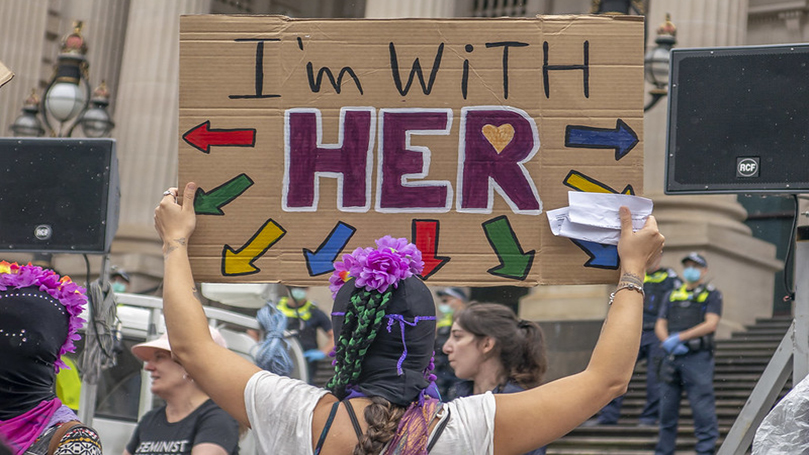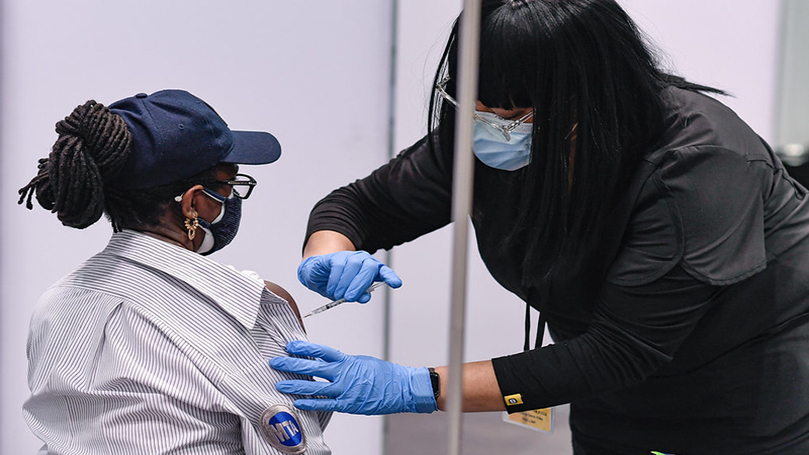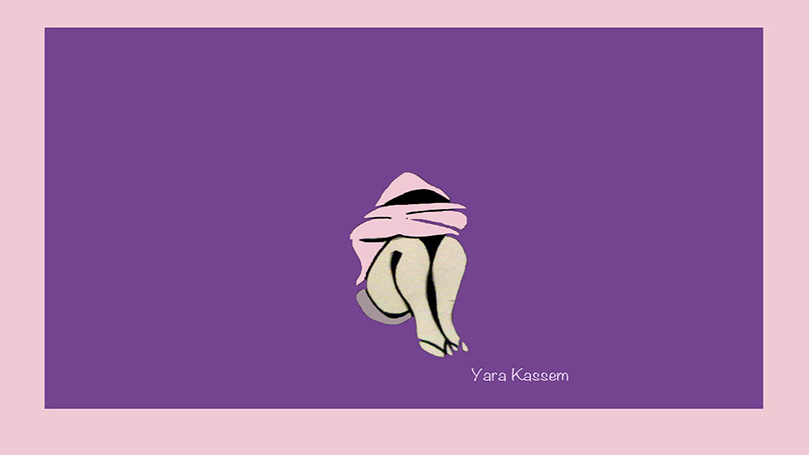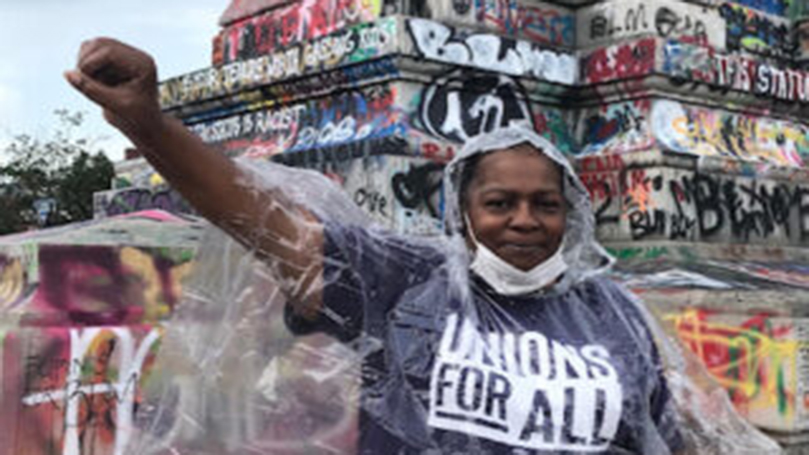
At the onset of the pandemic, the lies we were told about gendered progress melted away, and reality came rushing in for women of every race, nationality, and age. Forced to stay home or forced to go to work, women across the United States are suffering disproportionately during the Covid-19 pandemic. It is not because of the disease itself, but rather because gender equity cannot be achieved under capitalism. Indeed, gendered oppression is an integral part of how the system itself operates.
Young women who were raised to think that great strides were made in gender equity have had a difficult awakening for the past year. While some might argue that massive progress has been achieved in the past decades towards addressing gendered inequality — with a woman finally elected as vice president, no less — the rest of us have experienced, more than ever before, the patriarchal chains still weighing us down — and propping capitalism up.
During the pandemic, women have been the first to lose their jobs — especially women of color. If they are not out of work, they are more likely to be exposed to the coronavirus than their male counterparts. Women are more likely to have public-facing, essential jobs as healthcare workers, caretakers, food service workers, education workers, and, of course, sex workers. They became the workers who braved pandemic conditions without proper PPE, pay, or benefits.
Mothers are overrepresented as teachers, registered nurses, secretaries, health aides, and house cleaners, all jobs that have been heavily impacted by the pandemic. If they are among the 15 million families headed by single women, they must now juggle either unemployment, of which unmarried mothers suffer higher rates, or manage to afford and arrange childcare while they go to cover another RN shift at a hospital.

According to the U.S. Bureau of Labor Statistics, women lost their jobs at higher rates than male counterparts. At the height of the Covid-19 crisis in April 2020, nearly 11 million women became unemployed. In September of 2020, 80% of the million people who dropped out of the labor force were women. Why did they leave the labor force? Was it a choice?
Sociologist Jessica Calarco summed it up thus: “Other countries have social safety nets. The U.S. has women.” With schools closed, mothers were more likely to pick up the extra childcare labor than their male partners. They cooked more food because restaurants and cafes were shut down, and they cleaned homes that became messier with extra usage. They tutored their children as they struggled with online learning.
Under COVID-19, women are living in fear with their abusers. People of all genders can be caught in abusive relationships, but it is far more likely and, indeed, more deadly for women. Add pandemic conditions to a landscape already bare of assistance for domestic abuse survivors, and women are both more likely to face emotional, verbal, and physical abuse and also less likely to leave their partners. Perhaps they had never looked at the threadbare social services available for women caught in situations of domestic abuse, but having already taken the hit of lost income, increased hours of reproductive labor, as well as the general pandemic restrictions, they certainly were less likely to leave their abusers. Some are supporting unemployed partners with their own wages, taking care of the house and family, and still experiencing abuse. Unable to lean on networks of friends, family, and coworkers, these women became more isolated and vulnerable over time.

Domestic violence reports tripled in China during the lockdown. In Colombia, domestic violence rates spiked 94% for women between the ages of 29 and 59. In France, rates went up 30%. In the United States, however, the rates have not significantly increased. Do women simply have it easier here? Chillingly, domestic abuse resources saw rates of engagement with women drop during the pandemic. Women are less likely to leave the house and call for help, or to speak up to their friends and family about the problems they experience at home. A partner might be nearby and listening in. They are unable to visit websites about domestic abuse because their partner might be looking over their shoulder. Shelters and relocation services have become more fraught in a pandemic. After a summer of intense and widely broadcasted police violence, women are less likely to call the police if they feel they are in danger — especially if they are women of color.
In the United States, women are the safety net. And this safety net can only take so much before eventually becoming shredded and less likely to catch anything. In the aftermath of this pandemic, when it does come, a workers’ movement must make special demands for women so that a true, equitable safety net can be constructed for all.
This will require women to be organized, not just in labor — and all women benefit from union membership — but politically, as women. One example of this is the Federation of Cuban Women (FMC), a civil society organization that plays an important role in building power for women in all sections of Cuban society. With more than four million women involved, the FMC coordinates tens of thousands of volunteer social workers and medical professionals to determine, strategize, and work to meet the needs of women. They address local needs collectively and agitate collectively on a national scale. While women in Cuba and women in the United States have different needs, such an organization in the U.S. would be a helpful forum for bringing women into community with one another.

After all, under capitalist relations women are generally discouraged from forming community with one another, and competition between women is encouraged: white women against Black women, older women against younger women, able-bodied women against women with disabilities, cis women against trans women, and other forms of division. Just as workers are set against one another on the shop floor to redirect their discontent with their working conditions, so too are women set against one another to redirect their discontent with patriarchy.
On March 16, a 21-year-old white man murdered eight people, including seven women, an act of terror dismissively described by a sheriff as a “really bad day” for the killer. His victims were working in massage parlors located in so-called red-light districts. They were Asian women, among those who have so far borne the brunt of racist terror stoked by the previous administration who blamed the pandemic on the Chinese people and the current administration dead set on a new Cold War with China. They were migrant women, who face triple oppression as women and workers who are also undocumented, and so are more likely to experience abuse on the job.
Though details of their employment have not been confirmed, working in red-light districts has put women at risk of additional violence, as sex workers are disproportionately victimized by misogynist violence. There were many special circumstances that divided these women from the rest of us, and perhaps many women might not see the connection between these circumstances and their own, but like the witch hunts of old, violence done against these women made it easier to do violence against all women.
A proletarian women’s organization would need to understand these different special oppressions the women murdered in Atlanta faced, and could strategize a way to address them with equity while building a wider front against both patriarchy and capitalism. After all, the subjugation of women is a necessary prerequisite to the formation and reproduction of capitalism, as many Marxists have proved with over a hundred years of collective research.
Forcing women into the role of “safety net” ensures that capitalism can avoid meeting the needs of the working class, moving that obligation instead on to the backs of women. When economies are in crisis, women take up a double burden but also receive a double share of oppression. Like the working class, our only hope to combat this is to organize collectively for our joint liberation. Even though we have our differences, only by working together can we identify common causes and work to overturn them.
National Domestic Violence Hotline: 1-800-799-SAFE (7233).
Images: “I’m with her,” Matt Hrkac (CC BY 2.0); Frontline worker, MTA (CC BY 2.0); Domestic violence, Yara Kassem (CC BY-NC 2.0); Unions for all, SEIU blog.


 Join Now
Join Now